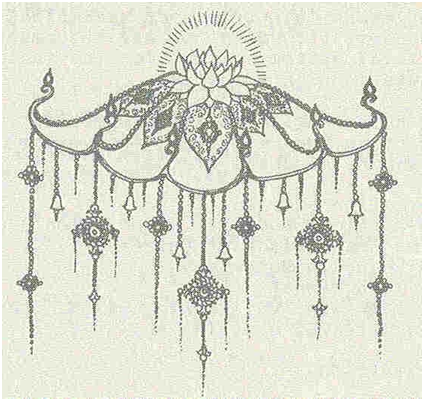Shurangama Mantra with Verses and Commentary
by Venerable Tripitaka Master Hsuan Hua
46. BÀ TẤT NÊ
婆悉泥
Sở hướng vô địch hiệu thắng quân
Bất
chiến nhi hàng khí giáp binh
Dĩ
đức phục nhân nhị tai họa
Vọng
phong phi ma hộ an bình.
所向無敵號勝軍
不戰而降棄甲兵
以德服人弭災禍
望風披靡護安平
PE
SYI NI
Wherever
they turn there is no enemy, they are called the Victorious Army.
Those who
surrender without a fight throw down weapon and armor.
By using
virtue to cause people to submit, calamities and disasters are
eliminated.
Their very
reputation scatters the troops; their protection brings peace and tranquility.
COMMENTARY:
PE SYI NI
translates as "Victorious Army." It is sometimes transliterated as
PWO CHIA HSIEH NI and translates as "Outside Ways, a Following of the
No-Thought Heaven." The Heaven of No-Thought is a place where those of
externalist ways reside. They have heavenly guerrilla forces. This military
group is such that wherever they turn there is no enemy, they are called the
Victorious Army. In other words, they are bound to win. As soon as they point
their weapons, the opposing forces are no match for them. This army is
ever-victorious.
Those who
surrender without a fight throw down weapons and armor. There are two ways you
can explain this line. If one's own army quits without a fight, puts down its
weapons and runs, that's one meaning. The opposing army calls out, "Put down
your weapons and surrender!" And your army of one accord replies,
"Yes!" as your soldiers drop their guns and run. But the troops try
to save face even in retreat, so the general of forces that only withdrew fifty
paces says of the troops who withdrew a hundred paces, "Look at those
cowards, they didn't have to run so far.' Does that make sense? Is that
criticism valid? Of course not, because they both retreated. The only reason
some only retreated fifty paces was because they were too scared to run
further. Given an airplane, they would have gone a thousand miles in no time.
But they had no aircraft or tanks during ancient times, and so they could only
run on foot.
The other
explanation is that your army is always victorious and the enemy always
surrenders without a fight. When the opposing forces hear that they are about
to be attacked by the "Victorious Army," they take off their armor,
set aside their weapons, and run. So in this case it is the opposing forces who
surrender.
"Throw
down weapons and armor" also refers to two different kinds of surrender.
One is when the soldiers remove their armor and put down their weapons and run.
The other is to set aside their weapons and armor and surrender on the
spot--not run away. In this case the defeated army says, "All right, we'll
do whatever you want. We'll obey your instructions."
By using
virtue to cause people to submit, calamities and disasters are eliminated. A general
must get people to submit by means of his virtue. That means an army should be
defensive, not offensive. It is not the purpose of military forces to indulge
in wanton killing. As it is said, "War results from quarrels over land,
and corpses fill the fields. War arises from conflicts over cities, and corpses
fill the street. The earth is made to eat the flesh of people. Such offenses
cannot be expiated by death."
Those who
specialize in harming and killing are commiting offenses. People in the armed forces
should conduct their affairs in a virtuous way. They should not be like General
Bai Chi of the Chin dynasty. He sent two hundred thousand soldiers to their
death. These soldiers had already surrendered to him. The two hundred thousand
men stood before him, ready to do what they were told. "Fine," said
the General, "Do as you are told and start digging trenches."
After they
dug trenches that were several miles long, he marched the two hundred thousand
soldiers into the trenches, covered them with earth, and buried them alive. And
they were men who had already surrendered to him! That is why, down to the
present, General Bai Chi is still being reborn as a pig. He is undergoing the
retribution of the hells and the animal realm because he was simply too cruel.
If you use virtue to cause people to submit, then calamities and disasters can
be averted.
Their
reputation scatters the troops, their protection brings peace and tranquility.
The name "Victorious Army" goes before them and the opposing forces
flee at its mention.


Comments
Post a Comment